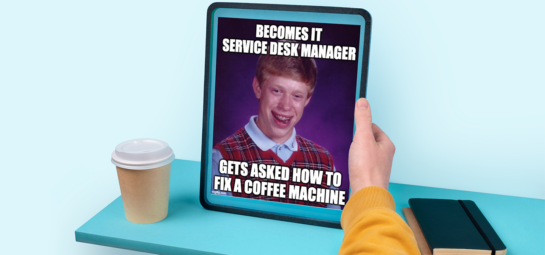Service Desk and AI: Why AI will Never Replace Humans

Artificial intelligence (AI): it’s a hot topic, but it’s also often misunderstood. And with AI chatbots like OpenAI’s ChatGPT generating excitement – and even panic – in industries from Journalism to IT, it’s more important than ever to look beyond the buzzword.
Is AI on the verge of taking over? Are people truly becoming redundant? And what does this mean for IT departments? Let’s find out.
What is artificial intelligence?
To start, let’s look at what we mean when we talk about AI. Gartner defines artificial intelligence as “applying advanced analysis and logic-based techniques, including machine learning (ML), to interpret events, support and automate decisions and to take actions.”
AI is used for a myriad of things: self-driving cars, face and speech recognition, e-payment, smart home devices, Google Maps, and so much more – probably without you even realizing it.
Businesses also heavily rely on AI. Machine learning (a subset of AI) is used for customer analytics and customer relationship management, for example, to better understand and serve customers.
Artificial intelligence in IT (service desks)
In IT, AI is employed for many different purposes, one of them being security. IT departments use machine learning to detect anomalies and identify suspicious activities that indicate threats. By analyzing data and using logic to identify any similarities to known malicious code, AI can detect new and emerging cyberattacks much faster than humans.
AI is also used in chatbots. These understand what customers are asking and provide the answer to these questions using natural language processing to simulate a chat. Thanks to chatbots, customers can still get the answers to their questions, even outside the IT department’s office hours.
The digital workforce goes one step further than chatbots: it’s a category of software robots that support and augment the work humans do. Digital workers are different from chatbots in that they can complete a task from beginning to end, whereas chatbots are only able to perform single tasks.
Artificial intelligence needs human ingenuity to work.
Are machines taking over?
But how mature is AI really? Mature enough to take over anytime soon?
In 2020, the World Economic Forum predicted that automation would displace 85 million jobs globally in the next five years. According to their report, roles in areas such as data entry, accounting and administrative support are decreasing in demand as automation and digitization in the workplace increases.
News like this is bound to create anxiety. Yes, AI is growing fast – but fast enough to have completely disrupted the workforce by 2030? We don’t think so.
First of all, it’s going to take years and years for AI and robots to catch up enough in both capabilities and numbers to make people truly redundant. Right now, ChatGPT might be smart enough to answer even complex queries, but experts say it still lacks the ability to think critically or make nuanced, ethical decisions, like a human being. It can also occasionally give answers which sound plausible but are just factually incorrect.
IT departments should be using AI to complement IT professionals and their work.
What does AI mean for IT departments?
Instead of employing AI to replace humans, IT departments should be using AI to complement IT professionals and their work.
AI is foolproof, fast, consistent, and efficient. So, play to these strengths. Use AI to reduce manual actions, increase data insights, or facilitate challenging tasks. This gives IT professionals more time and energy to focus on customer experience or solving complex incidents – tasks that require a human touch.
As AI continues to evolve and integrate into IT service desks, it’s clear that while it excels at automating repetitive tasks, it lacks the emotional intelligence and critical thinking that define human interaction. This is why AI will never replace humans in delivering exceptional customer service. IT professionals bring empathy, creativity, and nuanced decision-making to the table—qualities essential for understanding and addressing complex customer needs.
By leveraging AI to handle routine processes, IT teams can focus on high-value tasks, enhancing the overall service experience and driving innovation. AI is a powerful tool, but its true potential is unlocked when paired with human expertise.
To future-proof your IT operations and embrace the best of both worlds, consider implementing an ITSM solution that integrates AI seamlessly with human-led service management. Learn more about our ITSM solutions here and discover how they can transform your service desk strategy.
Curious about the state of the IT service desk of the future and what role AI will play in it? We’ve made some predictions:
Inspire others, share this blog



